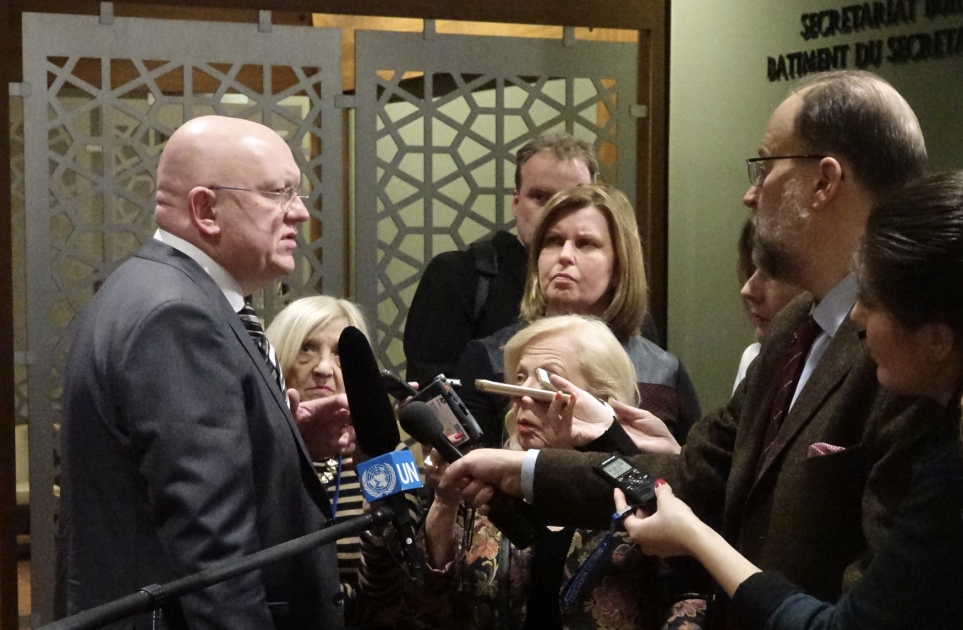Remarks by Permanent Representative Vassily Nebenzia, following the UN Security Council briefing on Ukraine
Q: Since you have been in the Security Council meeting there were reports that in the US we are talking about new sanctions against Russia.
A: You are talking about it all the time and we really do not follow. It is a permanent issue now, we just do not pay attention.
Q: So you do not worry at all about new sanctions, do you?
A: We have been through it for years now. We just do not bother. It is their business, not ours.
Q: Ambassador, can we ask you about Venezuela?
A: Yes, go ahead.
Q: Russia has proposed a draft resolution. Could you explain why Russia start saying that Security Council should not be involved in Venezuela?
A: You know that the US is sort of contemplating a draft Security Council resolution on Venezuela which as far as we understand – and I am sure you already saw it or had a chance to acquaint yourseves with it – completely shifts the accents upside down. We thought it was timely and appropriate to support territorial integrity, unity and sovereignty of Venezuela. It is a call for Venezuelans themselves to solve this issue peacefully, with no military intervention. Should this be the case, we will come up with it.
Q: Would you like to say the UN wrap up its humanitarian response in Venezuela?
A: If Venezuelan government asks the UN to do so – then yes. Because it is done upon request of the legitimate government. If the government feels like doing this – so it should be.
Q: Ambassador, are you worried about bloodshed in Venezuela?
A: I am worried about the bloodshed, but even more than that I am worried about inciting it. Because if there is no incitement – then we have better chances not to have any bloodshed.
Q: If there is vote on the US draft, will Russia be prepared to veto?
A: I cannot tell you now. First we need to see the US draft on the table. Then we will be weighing options of what we can do, but it is completely misbalanced.
Q: What about this calling for the recognition of Guido?
A: This is a very unfortunate attempt to interfere in the internal affairs of a sovereign country, which is not shared by the majority of the international community. We heard the statement of South African Development Community today, which supported the legitimate government and stood against interfering in domestic affairs. This should be the principle. It is not about Maduro government as such. It is first and foremost about the principle.
Q: What do you think about the humanitarian crisis in Venezuela?
A: I think the situation is not exciting, I mean economic situation. But it does not look like they have an acute humanitarian crisis. They may need some humanitarian assistance, but they should decide for themselves.
Q: When do you put forward your draft?
A: We are not putting anything anywhere. We are just discussing.
Q: Are you engaging on the US draft?
A: No, we do not have any consultations at the moment on it.
Q: Before you leave, Ambassador, a huge subject has not been in the spotlight in recent weeks, but you have Ambassador Pedersen coming here in the next two weeks to discuss Syria. Can you tell us what is going on with regards to the Constitutional Committee? You call the Syrian government to properly engage, correct?
A: Special Envoy Pedersen will hopefully come to the Security Council late February, I believe. So far, he has been touring around the world, speaking to the major players on the issue. He has been in Damascus, Riyadh, Moscow. I think he has been to Washington, Brussels, Ankara of course, so he has been gathering information and making up his mind. I think he is seriously determined to move the process forward. That of course includes working on the Constitutional Committee which we would like to see launched sooner rather than later. The day after tomorrow there will be a summit in Sochi, a trilateral summit of Astana-guarantors. It will be very important for the political process. Let us see what comes out of this summit on Thursday. I cannot speak for Geir Pederson himself, but we are very hopeful that the process will start moving.
Q: Do you mean there will be Constitutional Committee sometime soon?
A: Hopefully. As we have said before, we would like the Constitutional Committee to begin working as soon as they can, when everything is settled. Last year we set the timeframe of early 2019, which is now. We hope this will happen soon.
Q: One of the problems is caused by Syrian government. It has had problems with one of the lists. Have you put pressure on them?
A: No, I do not think Syrian Government had problems with the list. The Syrian government now cannot be accused as usually. There were other parties that were not happy with the list that we agreed upon at Astana. And that is being rectified. Some things might be changed in the third basket, but it is not about the Syrian government.
Q: Do you mean those things will be changed on Thursday?
A: You think the leaders, Putin, Erdogan and Rouhani will do this?
Q: But they will engage on Syria.
A: Syrians are not a party to this issue.
Q: Thank you.
A: You are welcome. And put it down that Ukraine is not fulfilling its commitments under Minsk Agreements. For a long time already.
